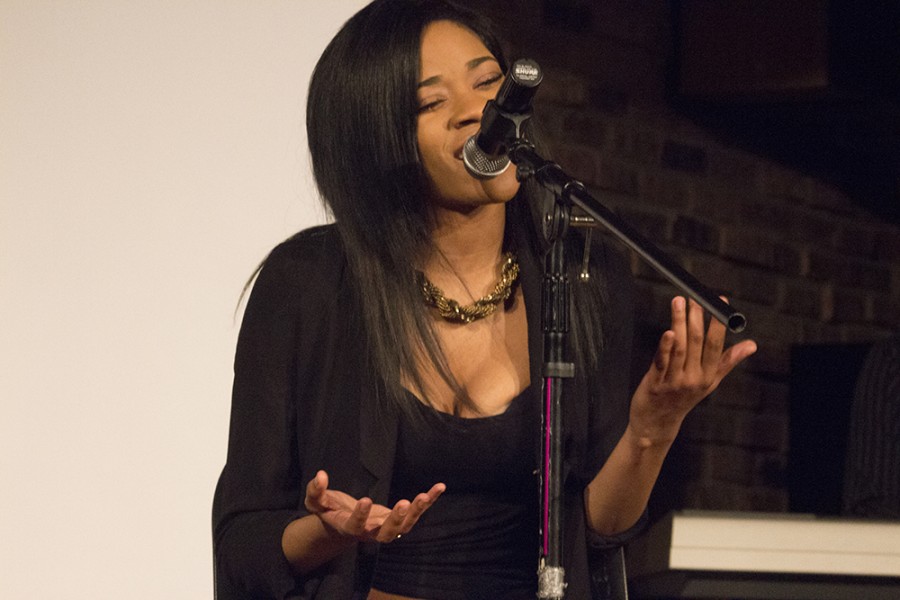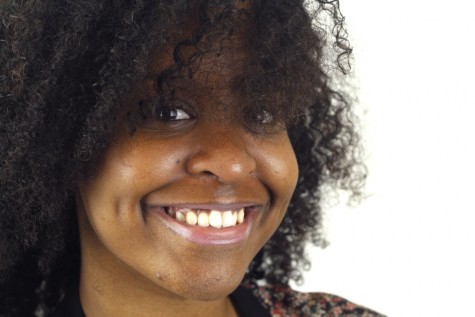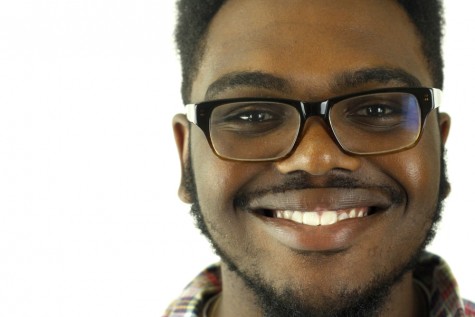Monologues give real life stories
Keyana Latimer, a sophomore sociology major sings during the “Cycle of Love” piece during the Chiraq Monologues on Tuesday in 7th Street Underground.
February 10, 2016
Focusing on the inner city problems of Chicago, the Chiraq Monologues brought campus members together to listen to the stories of eight students.
Bringing both fiction and real life stories to the stage, those eight students told tales of domestic, political and economic issues that occur in Chicago.
The Untold Truth organization created this event to inform the Charleston and Eastern community about firsthand accounts of people who experienced both violence and hardship while living in Chicago.
One student who graced the stage, Unique Anibaba, a senior adult and community education major told a story about living in Chicago and some of his trials he went through.
“I wasn’t street smart yet but I was learning it quick,” Anibaba said. “The next time I seen you was at your burial sight. We mourn terrible nights for the block we all started on.”
Many of the acts spoke on the violence in Chicago and why some of those crimes happen.
Deja Dade, a sophomore theater arts and communication studies major, found herself being questioned by the police in her fictional piece about being in a relationship with a drug lord in Chicago.
“Love has the power to make people do crazy things,” Dade said. “And unconditional love has the power to test your loyalty.”
Each student was introduced by music from a variety of Chicago artists.
Travon Moore, a senior accounting major, did a piece about witnessing his surroundings and questioning his faith in God.
“The nerve of you telling me (I) don’t belong to stay here,” Moore said. “ You gave us drugs and guns, you put AIDS here. I know most of my actions put me in cell, but how you mad at me when you threw me in this hell?”
Moore’s performance was seen as an inner conflict with all the things that went wrong in life, but still trying to make things right, but with an acted dialogue between him and God.
Briana Wesley, a sophomore biological science major, performed a piece called “Hey You Strong Black Men,” where she gives empowerment to African-American men.
“Without you strong black men in our lives, we women will become hopeless,” Wesley said.
Jasmyne Hertz, a freshman elementary education major, said she thought the night was informative and inspiring for her.
“You know, people take facts from one area and generalize whole Chicago land,” Hertz said. “This brings knowledge about what exactly is going on in our city, how we can help it and stop some things.”
Jeannie Ludlow, the coordinator of the Women’s Studies Department, said the different perspectives helped bring the community together to help address an ongoing issue: preconceived notions.
Ludlow said throughout the night the different topics helped to describe the different personnel from the city. She said when people hear stories their hearts open up.
“It doesn’t matter if it’s a true story or a fiction story inspired by something that’s real in somebody’s life, either way it opens your heart when you hear it,” Ludlow said.
The Untold Truth was taking donations for an organization that helps victims of gun violence in Chicago. Throughout the night the hosts asked their audience a series of questions about their feelings on certain topics in Chicago.
These topics were followed by some of the clips shown throughout the night. One clip included news coverage on rival gangs in Chicago.
Farrah Dean, the special events coordinator for the Untold Truth, said the significance behind the showing of the clips was to show more tales of Chicago citizens.
“It’s so those people who are not from Chicago don’t have these misconceptions of Chicago,” Dean said. “It’s so those people can get real life perceptions because these people are real, and their issues are real.”
T’Nerra Butler can be reached at 581-2812 or [email protected]





















































